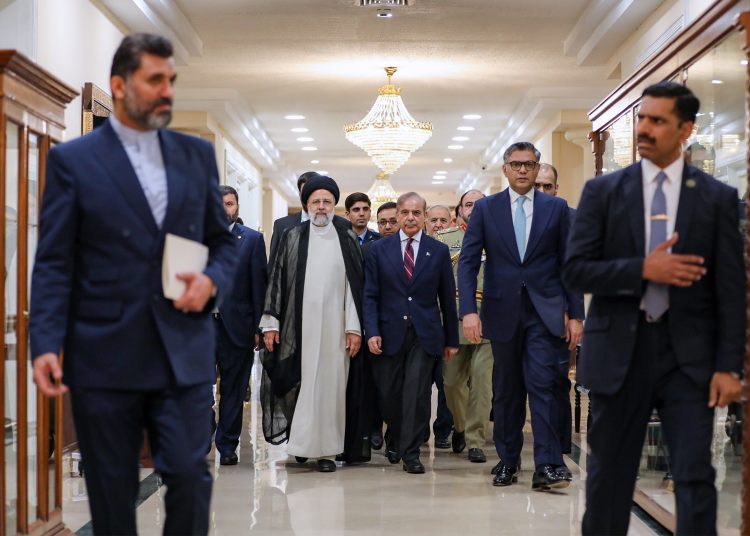President Ebrahim Raisi of Iran is currently on a diplomatic visit to Pakistan, spanning three days, aimed at deliberating regional and bilateral matters.
This visit comes on the heels of recent tensions between Iran and Israel and is scheduled three months subsequent to the tit-for-tat border attacks between Iran and Pakistan in January.
The primary objectives of President Raisi’s journey are to alleviate tensions, particularly concerning security and border matters, and to enhance bilateral relations, with a focus on economic and energy cooperation.
Today, President Raisi engaged in discussions with Pakistan’s Prime Minister Shehbaz Sharif and is slated to meet with President Asif Ali Zardari and Army Commander Asim Munir, who play pivotal roles in shaping Pakistan’s political and security landscape.
Additionally, Iranian president’s itinerary includes visits to Lahore and Karachi to further economic collaboration.
The diplomatic bond between Iran and Pakistan dates back to Pakistan’s foundation in 1947, with Iran being the first state to acknowledge Pakistan’s sovereignty. This mutual recognition was reciprocated by Pakistan in 1979, following the triumph of Iran’s Islamic Revolution.
Despite sharing a 900-kilometer border, the relationship between the two nations has largely been amicable, albeit occasionally marred by tension and border skirmishes. A notable incident occurred in January of this year when Iran took the unusual step of targeting the Jaish al-Adl terrorist group’s encampment within Pakistan’s borders, prompting a swift response from Pakistan. Both countries promptly addressed the situation, reaffirming their commitment to counter-terrorism collaboration.
The two governments are actively pursuing an expansion of their bilateral trade, which currently stands at around $2 billion. In a joint press conference today in Islamabad, President Raisi revealed plans to potentially increase trade volume to $10 billion as an initial target. Today, high-ranking officials from both countries ratified eight documents of cooperation in Islamabad.
Informal trade, including commodities like liquefied petroleum gas (LPG) and crude oil, plays a significant role in their economic exchange. Iran also contributes to the power supply of Pakistan’s Baluchistan province and other border areas.
Approximately a year ago, Sharif and Raisi inaugurated the first border marketplace at the Mand-Pishin crossing, symbolizing their commitment to economic integration.
Furthermore, as members of the Organization of Islamic Cooperation (OIC), the two neighbors share profound cultural and religious ties, with tens of thousands of Pakistani Shias undertaking pilgrimages to Iran annually.
The solidarity within the OIC has bolstered Islamabad and Tehran’s united stance on critical Islamic world issues, such as the Palestinian cause. Public sentiment in Pakistan is predominantly anti-Israel, with widespread celebrations erupting in the wake of Iran’s retaliatory military operation against Israel.
Pakistani media outlets have been abuzz with commendations for Iran’s bold stance, and there have even been calls for the Pakistani military to join the fray.
External influences, notably the dynamics between Islamabad and Washington, have also impacted Iran-Pakistan relations. The post-9/11 era saw the United States emerge as a dominant force in Afghanistan, with Pakistan’s alliance with the US straining its rapport with Iran.
The Iran-Pakistan (IP) pipeline project, signed in 2014, epitomizes the delicate balance Pakistan maintains between Tehran and Washington. Despite the agreement, progress has been hampered by concerns over US sanctions.
Nevertheless, it appears that both capitals are earnestly striving to cultivate balanced relations across political, security, economic, cultural and energy sectors. Amidst the evolving regional dynamics and shifting alliances, Iran and Pakistan are keen to reinforce their partnership.






